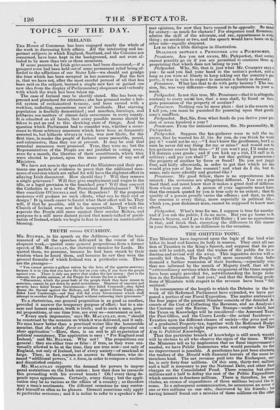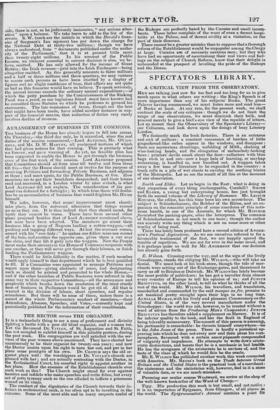THE OMITTED TOPIC.
THE Ministers have improved upon the logic of the bird which hides its head and fancies its body is unseen. They omit all mention of Taxation in the King's Speech, and suppose that its pres. sure will be unfelt, and that the wishes of the public for its reduction and revisal will die away. This ingenious device will as. suredly fail them. The People will more earnestly than before demand a further remission of their burdens,—especially when they are informed by the mouth of Majesty itself, that all the "extraordinary services which the exigencies of the times requirel have been amply provided for, notwithstanding the large reduction in the Estimates of last year," and that the flattering predictions of Ministers with respect to the revenue have been "fully realized."
In consequence of the length to which the Debates in the first week of the Reformed Parliament have extended, we have postponed a portion of our Fiscal Exposition. The matter embraced in the four pages of the present Number consists of the detailed Accounts of the Cost of Collecting the Revenue, and an Analysis ui the Customs and the Excise. The Stamps—under which head the Taxes on 'Knowledge will be considered—the Assessed Taxes, the Post-Office, and the Crown Lands—the actual Incidence e: Taxation upon the different classes of society—the pros and cone of a graduated' Property-tax, together with the Reformed Budget —will be comprised in eight pages more, and complete the Third Key to Political Knowledge. That this particular branch of knowledge is still much wanted, will be obvious to all who observe the signs of the times. Whilst the Ministers tell us by implication that no fiscal improvement is needed, we have Public Instructors who would persuade us that no improvement is possible. A gentleman has just been alarming the readers of the Herald with financial horrors of the most tremendous kind. The net revenue paid into the Exchequer, says he, is only forty-four millions. Of this sum thirty-two millions and a half is necessary to pay the National Debt, and other fixed charges on the Consolidated Fund. There remains but eleven millions and a half to defray the rest of the Public Expenditure, which amounts to fourteen millions. There is therefore, he cofl. eludes, an excess of expenditure of three millions beyond the income. In a subsequent communication, he announces. an error of one or two millions on one aide,discovered by his friends ; but having himself found out a mistake of three millions-oil the othet side, there is not, as he judiciously insinuates," any serious alteration" upon a balance. We take leave to add to the list of the errata. S. W. (such are the initials in which the Herald's financier of Sergeant's Inn rejoices) has put down the charge for the National Debt at thirty-two millions ; though we have always understood, from "documents published under the authority of the Parliament," that it is at present little more than twenty-eight millions. In his account of the Public s Income, an element essential to correct decision is also, we believe, omitted. He has only allowed for the income of Great Britain ; the Irish revenue—paid into the Irish Exchequer—being altogether omitted. As this generally amounts to three millions and a half or three millions and three quarters, we may venture to assure such persons as have been startled by a display of figures and no slight confidence of tone, that affairs are not quite so bad as this financier would have us believe. To speak seriously, the annual income exceeds the ordinary annual expenditure ;—of which the petty purchase by the Commissioners of the Sinking Fund was a proof, as our ingenious friend must have known had lie consulted those Statutes on which he professes to ground his statements. The late remissions of taxes, though not the best that might have been made, have added another instance in support of the financial maxim, that reduction of duties very rarely involves decline of revenue.



















 Previous page
Previous page